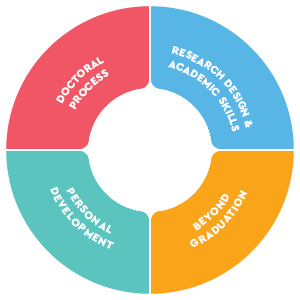

The University of Malta is committed to ensure that its doctoral students are trained to develop transferable skills as part of their professional development. This should enhance their employability and augment the quality of their research.
Doctoral students who commenced their studies from February 2023 onwards must complete approximately 100 hours of training during the course of their Ph.D., as mandated by the Doctor of Philosophy - PhD Regulations, 2023 [PDF]. While no certificate will be issued for attending the Professional Development Programme, a list of attended workshops will appear on your degree transcript issued by the Registrar’s Office, and will be included in the 100 hours of training.
None of the workshops offered as part of the Doctoral School’s Professional Development Programme are mandatory with the exception of DOC6043 Research Integrity and Research Ethics for students who commenced their studies from February 2023 onwards.
The Doctoral School is pleased to present the Professional Development Programme Catalogue 2025/26 [PDF] and the Semester 1 Timetable [PDF] for the academic year 2025/26.
Registrations to participate in the workshops will be accepted on a first-come first-served basis through the eSIMS portal, from 09:00 on Wednesday 10 September to midnight on Wednesday 17 September 2025. Late applications will not be accepted. There is no limit to the number of workshops one can select but once the registrations are confirmed there will be no possibility to add or change the selection.
Some workshops require that participants present some work prior to the date of the workshop. Care should be taken to follow deadlines and instructions given on the workshop description. The workshops’ mode of delivery has been included in the Professional Development Programme Catalogue 2025/26. Hard copies of the catalogue will be available from the Office of the Doctoral School from Wednesday 10 September 2025/26.
Resident academics pursuing doctoral studies at universities abroad, post-doctoral researchers employed by the University of Malta, as well as Research Support and Scientific Officers will once again be able to benefit from a number of the workshops on offer through an initiative being taken in collaboration with the Office for Human Resources Management and Development.
Doctoral Researchers are encouraged to participate in the Professional Development Programme workshops in an active and engaged manner, being considerate of the views and feelings of other students who may hail from disciplines outside their own.
Each workshop will run if there is a sufficient number of applicants.
Instructions [PDF] on how to access details about registered workshops and how to synch with one's Google calendar are now available. This will allow Doctoral Researchers to view their workshops' schedule, as well as the venue and time. Information emails will no longer be sent prior to each workshop.
The Doctoral School has a cancellation policy whereby failure to attend more than three workshops without a valid reason for doing so will lead to not being able to attend other doctoral school workshops in the future. Valid reasons for late cancellation or for missing a workshop involve illness and unplanned leave of absence. If a registered participant is unable to attend a workshop for unforeseen and exceptional circumstances they should send an email to professionaldevelopment.committee@um.edu.mt.
To succeed in your research degree, you will need to develop a wide range of research, professional and transferable skills. These skills can be useful in a variety of different contexts and roles, ensuring that whatever task or job you are undertaking, you have the ability to succeed. These workshops will give you a chance to develop skills in creativity, problem solving, communication, debating, and organization.
Each workshop has been labelled as ‘early’ (i.e. 1st year of full-time study), ‘mid’ (i.e. 2nd year, or having completed your MPhil/PhD transfer) or ‘late’ stages (i.e. towards the end of your research degree). Look at our Infographic [PDF].
The Professional Development Programme workshops are grouped in four clusters:

These workshops focus on key stages of your doctoral programme, including the transfer (MPhil/PhD) stage and the viva-voce examination. Workshops also look at how you can develop skills to flourish under pressure.
Effective academic and research skills are key components of a successful research process and range from research design to presentation skills, crucial for conferences and publication.
These workshops help you develop personal qualities and approaches, useful strategies, and skills and techniques which will further hone your professional skills and showcase your ideas to good effect.
Those doctoral students who are involved in any teaching activities are encouraged to follow DOC6033 Basic Lecturing Skills.
Research suggests that only 25% of doctoral students go on to work in research institutions or universities in Europe. These workshops are designed to help you learn more about your post-doctoral career options and to pitch the skills you gained as a doctoral researcher to a range of employers.